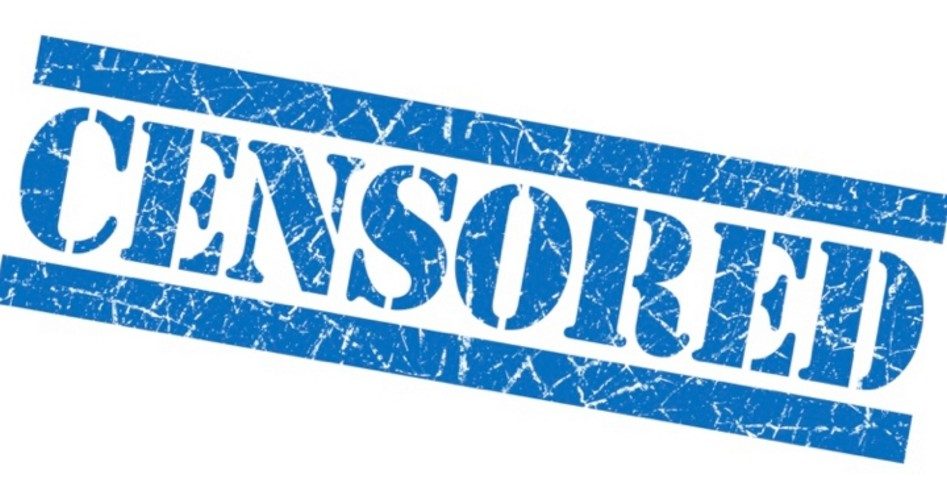
In a move designed to chill free speech, a German “justice” official has proposed fining social-media sites up to $53 million for not swiftly deleting “hateful” posts. Welcome to the new Germany — same as the old Germany.
Justice Minister Heiko Maas, a member of the leftist Social Democratic Party, acknowledged that social-media sites had already taken steps to voluntarily suppress speech. But in issuing his Orwellian proposal, he stated, “‘This isn’t sufficient yet’ … citing research that he said showed Twitter deletes just 1 percent of illegal content flagged by users, while Facebook deletes 39 percent,” reports the Associated Press.
While German Ministry of Justice spokesman Piotr Malachowski had in January cited entries such as “gas the Jews” as an example of the kind of repugnant postings justifying government action, that’s just a selling point. The extreme concern over politically incorrect online speech arose only after Germany invited an influx of unassimilable Muslim migrants, who are generally impossible to vet and sometimes criminally inclined, prompting some Germans to complain online. The current crackdown is aimed at anti-Muslim sentiment — not anti-Jewish sentiment.
The latest proposal is über-intrusive, too, requiring “companies to provide around-the-clock service for users to flag illegal content, which would have to be removed by the site within seven days. All copies of the content would also have to be deleted and social media companies would need to publish a quarterly report detailing how they have dealt with such material,” the AP also informs.
Most chillingly, sites would be forced to “nominate” a person to field complaints; this individual could personally be fined in excess of $5 million if his employer doesn’t satisfy mandatory standards, according to the AP. What kind of masochist would want such a job remains to be seen, but one would imagine only the most handsome compensation could induce someone to assume such risk.
{modulepos inner_text_ad}
But the result of this is clear (and likely intended): Threatening companies with hefty fines — and an individual with financial destruction — will ensure they’ll delete any and every even borderline politically incorrect, migrant-oriented post. It could completely stifle social-media dissent.
This is just a way to coerce social media into presenting reality as do conventional media. The media willingly cooperate with the government, for example, by suppressing the truth about migrant crime. But people on social media won’t cooperate, so you have to suppress them.
Germany has long been heavy-handed in the stifling of politically incorrect dissent. In July, government officials actually “directed the police to carry-out a nationwide crackdown on allegedly racist or xenophobic posting on social media sites,” reported the Daily Wire last November.
Quoting the Wall Street Journal, the site continued, “In raids coordinated by the federal criminal police agency BKA, police across 14 states raided the homes of 60 people suspected of being behind the postings, which are illegal under German law.”
This followed a number of other such raids, including an April Berlin-area action resulting in nine arrests of people accused of posting “anti-migrant” views.
And social media companies got the message. Fox News reported this January that Facebook had already “hired a German technology company to monitor and delete content that is illegal in Germany and other European countries” and that “[s]ix hundred people, fluent in several languages, scan the site daily.”
This, again, brings social media more in line with their mainstream cousins. One of Germany’s largest media outlets, Der Spiegel, long ago “disabled its readers’ comment function for articles related to refugees,” reported the Washington Post January 2016.
And this is common, especially among European media. When such a website presents a notice to the effect of, “We are currently unable to accept comments on this article,” know it’s a lie. Capability has nothing to do with it — what they mean is they won’t accept feedback.
After all, posters can do the job reporters won’t do: tell the truth. And it’s not a good business model to have a comments section that exposes the article as propaganda.
The Maas proposal was not unexpected. In fact, wrote Reuters in 2016, the minister had “repeatedly warned that he will propose legislation if the social media networks do not remove at least 70 percent of hate speech by March” of this year. A task force had been assembled to make this assessment.
Of course, some targeted posts actually do include violent or bigoted rhetoric (this still doesn’t justify Germany’s actions). Yet this isn’t necessary to be deemed thoughtcrime in the Fatherland. In 2016, German authorities prevented a comedian from publicly reciting a poem that demeaned Turkish president Recep Tayyip Erdogan, a despotic ruler who himself has, just recently, demeaned Dutch leaders by likening them to Nazis.
One doesn’t have to be a cynic to suspect that the German government’s main concern isn’t “hate.” Why, as relativistic as Western leftists are, they should be the first to insist that one man’s hate is another’s love. Rather, their primary fear might have been related by journalist Ute Schaeffer when he observed, reported Fox, “that tweets and online posts can lead to violence, or impact election results.” (Emphasis added.)
In fact, Germany has an upcoming federal election — in which Chancellor Angela Merkel could lose power — in September. And it’s no mystery why many Germans are unhappy. As the Gatestone Institute wrote in January, pointing out that “Germany is no longer safe,”
Mass migration from the Muslim world is fast-tracking the Islamization of Germany, as evidenced by the proliferation of no-go zones, Sharia courts, polygamy and child marriages. Mass migration has also been responsible for a host of social disruptions, including jihadist attacks, a migrant rape epidemic, a public health crisis, rising crime and a rush by German citizens to purchase weapons for self-defense — and even to abandon Germany altogether.
The even larger picture is that governments never like dissent, and the deeper issue is that Internet free speech threatens European statists’ multiculturalist, globalist model. Western leaders — aided and abetted by a complicit, propagandizing media — aim to suppress the truths in the above-quoted passage. Having social-media users express them encourages further revolt against the New World Order establishment.
What really drives these hate-speech laws is not hate of hate, but hate of Truth. As to this, note that one of the organizations in the German task force that analyzed online content is “Network Against Nazis.” It’s headed up by a woman who was an informant for the STASI — the secret police of the East German communist government.
Yes, welcome to the new Germany — same as the old Germany.



